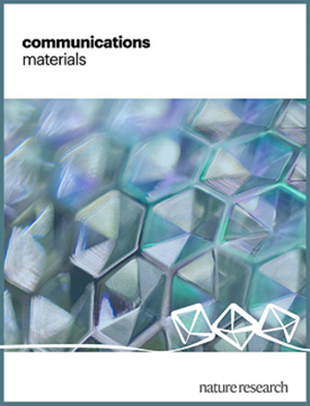In-situ X-ray imaging of the breakup dynamics of current-carrying molten metal jets during arc discharge
IF 7.5
Q1 MATERIALS SCIENCE, MULTIDISCIPLINARY
引用次数: 0
Abstract
The flow dynamics of current-carrying molten metal jet breakup during arc discharge serves as mass and heat sources in wire-arc-based metal deposition processes, thereby optimizing the resultant product quality. However, the spatiotemporal flow interaction between the molten metal jet and the surrounding arc plasma remains unclear. Here, using in-situ synchrotron X-ray imaging, we simultaneously track surface deformation and internal flow in molten aluminum jets during argon arc discharge. We reveal that modulating the magnitude and path of the arc discharge current can accelerate the jet velocity by 200–300% beyond its initial injection speed, thereby facilitating significant jet elongation. Our results provide consistent evidence that the jet flow dynamics are predominantly governed by the interaction between the arc discharge current and its coaxial self-induced magnetic field. This study establishes a framework at the intersection of fluid dynamics and electromagnetism, contributing to optimized control and precision in wire-arc-based applications. Understanding the dynamics of the breakup of current-carrying molten metal jets during arc discharge is vital in metal deposition processes. Here, X-ray imaging of a molten aluminum jet reveals how process parameters can be used to control jet dynamics, such as velocity.

电弧放电期间载流熔融金属射流破裂动态的原位 X 射线成像
在电弧放电过程中,载流熔融金属射流破裂的流动动力学是线弧金属沉积工艺的质量和热源,从而优化了产品质量。然而,熔融金属射流与周围电弧等离子体之间的时空流动相互作用仍不清楚。在这里,我们利用原位同步辐射 X 射线成像技术,同时跟踪了氩弧放电过程中熔融铝射流的表面变形和内部流动。我们发现,调节电弧放电电流的大小和路径可将射流速度提高 200-300%,超过其初始注入速度,从而促进射流的显著伸长。我们的研究结果提供了一致的证据,证明射流动力学主要受电弧放电电流与其同轴自感应磁场之间的相互作用所支配。这项研究在流体动力学和电磁学的交叉点上建立了一个框架,有助于优化基于线弧的应用中的控制和精度。了解电弧放电过程中载流熔融金属射流的破裂动力学对金属沉积过程至关重要。这里,对熔融铝射流的 X 射线成像揭示了如何利用工艺参数来控制射流动力学,例如速度。
本文章由计算机程序翻译,如有差异,请以英文原文为准。
求助全文
约1分钟内获得全文
求助全文
来源期刊

Communications Materials
MATERIALS SCIENCE, MULTIDISCIPLINARY-
CiteScore
12.10
自引率
1.30%
发文量
85
审稿时长
17 weeks
期刊介绍:
Communications Materials, a selective open access journal within Nature Portfolio, is dedicated to publishing top-tier research, reviews, and commentary across all facets of materials science. The journal showcases significant advancements in specialized research areas, encompassing both fundamental and applied studies. Serving as an open access option for materials sciences, Communications Materials applies less stringent criteria for impact and significance compared to Nature-branded journals, including Nature Communications.
 求助内容:
求助内容: 应助结果提醒方式:
应助结果提醒方式:


